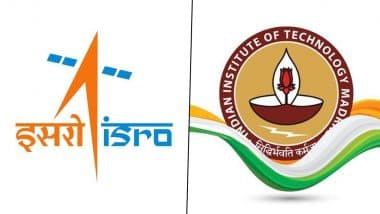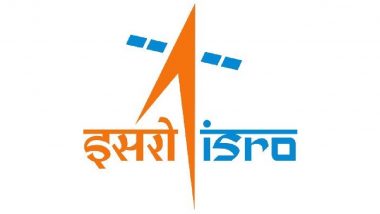Chennai, November 16: The upper stage of the Indian rocket that put into orbit the Chandrayaan-3 spacecraft came back to earth and hit the North Pacific Ocean, said the Indian space agency. According to Indian Space Research Organisation (ISRO), the cryogenic upper stage of the LVM3 rocket that had carried the Chandrayaan-3 spacecraft made an uncontrolled re-entry into the Earth's atmosphere, around 2.42 p.m. on Wednesday.
"The probable impact point was predicted over the North Pacific Ocean. The final ground track did not pass over India. This rocket body (NORAD id 57321) was part of the vehicle (rocket) that successfully injected the Chandrayaan-3 spacecraft into the intended orbit of 133 km x 35823 km with a 21.3o inclination on July 14, 2023," ISRO said. The re-entry of the rocket body took place within 124 days of its launch. Chandrayaan-3 Launch Vehicle's Part Makes Uncontrolled Re-Entry Into Earth's Atmosphere, Says ISRO; Probable Impact Point Predicted Over North Pacific Ocean
The post-mission orbital lifetime of the LVM3 M4 Cryogenic upper Stage is, thus, fully compliant with the "25-year rule" for LEO (Low Earth Orbit) objects as recommended by the Inter-Agency Space Debris Coordination Committee (IADC). Post Chandrayaan-3 injection, the upper stage had also undergone "passivation" to remove all residual propellant and energy sources to minimise the risks of accidental explosions as per the space debris mitigation guidelines prescribed by the United Nations and IADC, said ISRO. NASA, ISRO Gearing Up to Launch Joint Space Mission to Map Globe Every 12 Days; Synthetic Aperture Radar To Be Launched Aboard GSLV Mark-II in 2024.
Passivation and Post-mission disposal of this rocket body in adherence to the internationally accepted guidelines once again reaffirms India’s commitment to preserve the long-term sustainability of outer space activities.
(The above story first appeared on LatestLY on Nov 16, 2023 02:14 PM IST. For more news and updates on politics, world, sports, entertainment and lifestyle, log on to our website latestly.com).













 Quickly
Quickly











 Chandrayaan 3 Spacecraft
Chandrayaan 3 Spacecraft




